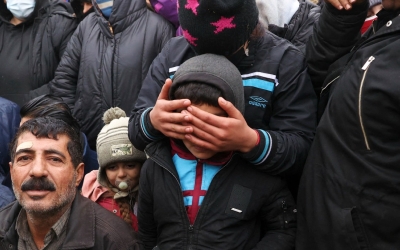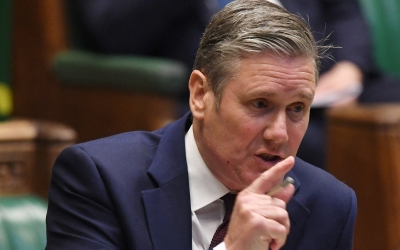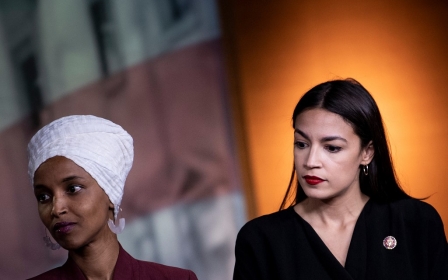Ukraine crisis: Why global conflict is no longer unthinkable

Russia and Nato's standoff over Ukraine led to a frosty encounter between US Secretary of State Anthony Blinken and his Russian counterpart Sergey Lavrov in Stockholm last week. With tensions rising over Russian troop movements on Ukraine's border, Moscow has warned Nato that any further expansion eastward to include Ukraine and Georgia would cross a dangerous "red line".
Blinken said that US President Biden would meet his counterpart Vladimir Putin soon, a meeting that could avert any escalation into conflict. However, the level of tensions in eastern Europe and other global hotspots, such as Taiwan, do point to growing instability as the US pulls back from its former role as global policeman.
Post-Brexit Britain, now cut loose from the EU, is busily jettisoning the very international 'rules-based' system it claims to uphold
Historian Niall Ferguson earlier this year pointed to the US's withdrawal from Afghanistan as comparable to the decline of the British empire in the 1920s and 30s - with Washington's increasing inability to act as the global power parallel to London's impotence a century ago.
In the early 20th century, with the rise of imperial pretenders Germany and Japan and the decline of Pax Britannica, the old order disintegrated in two global wars of unprecedented violence. Revolution and imperial collapse swept away the liberal and aristocratic order that had governed the continent since the Congress of Vienna in 1815.
White supremacy
New MEE newsletter: Jerusalem Dispatch
Sign up to get the latest insights and analysis on Israel-Palestine, alongside Turkey Unpacked and other MEE newsletters
Ferguson, a big fan of Winston Churchill, has rarely seen a war that he didn't think the West should fight to preserve its global dominance. But his warnings about the echoes of the 1930s are salient, if not because of the lack of western resolve that is claimed led to US withdrawal from Afghanistan.
Rather, it is the revival of the very ethnonationalism that led to war in the mid-20th century. Colonialist white supremacy, which became the dominant ideology in late 19th century Europe, gave birth after World War One to fascism and counter-revolution in the 1920s and 30s, and then to another world war.
The post-1945 order in Europe, and the UN Charter, was designed to ensure that the world never descended again into total war by expunging aggressive nationalism and racial supremacy. That held the peace in Europe, if not the rest of the world, for most of the past 75 years, with the exception of the Balkan wars in the 1990s.
In recent years right-wing populists have come to power in the United States, and across eastern and central Europe, with highly revisionist views of the major 20th-century conflicts. The recent confrontation on the Poland-Belarus border in which Middle East refugees were made pawns, and the tensions in Ukraine, are warning signs that the lessons of that century are being slowly forgotten.
UK and Israel
Post-Brexit Britain, now cut loose from the EU, is busily jettisoning the very international "rules-based" system it claims to uphold: it has recently sent troops to the Polish border, and is closely aligned with Europe's populist-nationalist regimes such as Hungary and Poland.
The UK is also drawing ever closer to Israel, which is a friend and military ally to all of Europe’s right-nationalist governments. Indeed ethnonationalist Israel is a key player in the new global right-wing axis.
Britain and Israel signed a military and trade pact last week that UK Foreign Minister Liz Truss and her Israeli counterpart Yair Lapid said would "spur technological breakthroughs" and see Israel "officially become a tier-one cyber partner for the UK". As Chris Doyle, director of the Council for Arab-British Understanding, said to Middle East Eye: “Given Israel’s record, it is extremely dangerous for the UK to be embracing its high-tech sector."
With its military and technological prowess, Israel offers a unique portfolio of weaponry and surveillance systems to nations in four continents. In return, Israel seeks to obtain important political commitments - primarily to its all-pervasive, one-sided definition of terrorism and antisemitism, and acceptance of its permanent occupation of Palestinian lands. Whether it's the UK, eastern Europe, or India, embracing Israel comes with a set of “values” that are inimical to democratic pluralism and global peace.
The way that antisemitism is being deployed across British universities against pro-Palestinian activism, and by Labour leader Keir Starmer to crush the left-wing membership of his party, makes it very clear that aligning closely with Israel is not simply a matter of military and intelligence links. It invariably involves a McCarthyite political regime that targets supporters of national liberation, democracy and equality everywhere.
Since Brexit and the 2019 election, the UK has strengthened military ties to Israel, purchasing a $137m remote targeting system for the army, flying RAF jets over Israel for the first time since 1948, and contracting Israeli drone makers Elbit Systems to patrol British shores against refugees fleeing persecution, and western-backed wars and sanctions in the Middle East.
The end of an era
In the anarchic geopolitical order that is replacing the traditional intergovernmental system created after World War Two, bilateralism is the name of the game. This informal system, heavily favoured by former president Donald Trump, encourages adventurist foreign policy and increasing military confrontation in global hotspots.
Localised conflicts such as Ukraine, Algeria-Morocco, or Ethiopia’s civil war could escalate in the absence of a strong hegemonic power or international arbitration to contain the troubles
In the last 18 months there has been a war in the Caucuses with Turkey and Israel giving Azerbaijan the military edge over its Armenian enemy; an escalating civil war in Ethiopia; intensifying violence in Yemen's long-running conflict; while in North Africa, Algeria is in a standoff against Morocco, the latter emboldened by its growing military alliance with Israel.
The post-war architecture of the UN, Nato, and multilateralism has been bypassed in favour of ad hoc alliances such as the recently formed AUKUS, aimed at containing a rising China. The cold war between China and the West is not necessarily the greatest source of potential conflict - rather, localised conflicts such as Ukraine, Algeria-Morocco, or Ethiopia’s civil war could escalate in the absence of a strong hegemonic power or international arbitration to contain the troubles.
American impotence
On the global stage, the decline of US power in the face of regional conflicts and climate change are defining features of geopolitics in this historical moment. This was seen at the Cop26 climate summit last month, when fossil fuel powers Saudi Arabia, China, and India appeared to call the shots and dilute commitments on emission reductions.
The intersection of US domestic political polarisation and its international impotence are writ large.
The moment of hope that accompanied Joe Biden’s election victory in November last year is being frittered away by the inability of the Democratic president to deliver on promises of a new social contract with the American people. Biden's Infrastructure bill was whittled down to a business-as-usual spending plan, while the Build Back Better proposals of paid childcare, basic parental leave, expanded Medicare, and a Green New Deal could go the same way, blocked by Republicans and right-wing Democrats in the gridlock of Washington.
Liberal centrism wedded to a dying neoliberal order looks incapable of building a broad coalition to defeat the forces of Trumpist Republicanism. A reckoning could come at the 2022 mid-term elections and then a possible return to power for Trump in 2024, with the Republicans ahead in recent polls.
If hope cannot be kindled among working-class Americans, Trump has a tried and tested recipe of fear, bigotry and resentment toward the state, now intensified by the new battle over measures to contain Covid-19.
In Europe, France’s presidential election in 2022 will see two far-right candidates vying against the increasingly authoritarian neoliberalism of Macron, with no sign of a credible left-wing candidate to present an alternative to French voters. If the far right wins, the EU's tilt to authoritarianism will be turbocharged. (In Germany, a centre-left-Green-liberal coalition has put forward bold plans on climate and migration, but has to deal with a renewed Covid crisis that could overshadow its other goals.)
With anarchic bilateralism and populist nationalism on the march, the current decade has all the makings of an end time for the global political order built on the ashes of 1945. In the early 20th century, racist ideologies and imperialist militarism drove the world toward total conflict. Sadly, a reinvented version of the same politics could do it again.
This article is available in French on Middle East Eye French edition.
Middle East Eye delivers independent and unrivalled coverage and analysis of the Middle East, North Africa and beyond. To learn more about republishing this content and the associated fees, please fill out this form. More about MEE can be found here.








